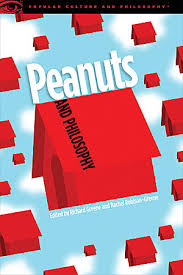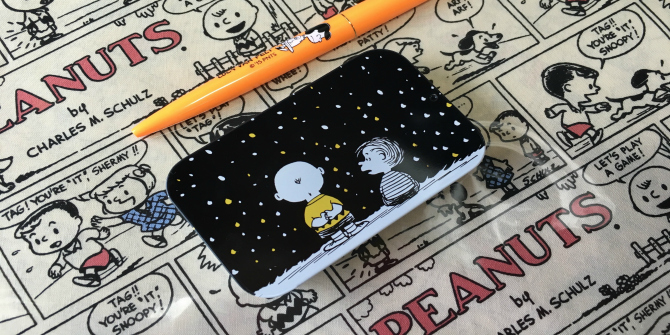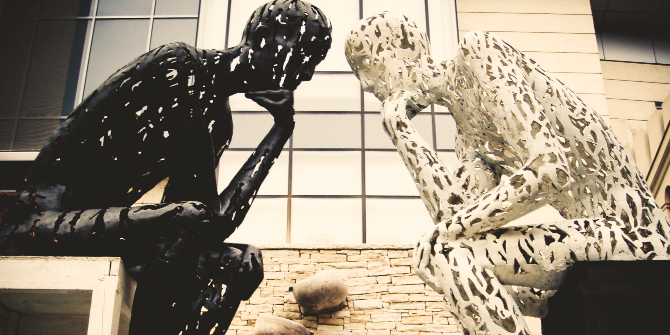Charles Schulz, creator of Peanuts, once said that his life’s work was just a ‘plain old comic strip, which helps to sell newspapers’. But a new book chapter from two of his fans, Dr Paolo Dini and Mario Barile, argues that the social and psychological insights of Schulz’s work should not be overlooked, writes Peter Carrol.
This post was originally published as a LSE ‘Research Highlights’ feature.
‘European Intellectuals Follow Charlie Brown!’ Peanuts and Philosophy: You’re A Wise Man, Charlie Brown! Richard Greene and Rachel Robison-Greene (eds). Open Court Publishing. 2016.
Not Just Peanuts
 In October 1950, 28 year-old Charles Schulz debuted the Peanuts comic strip in syndicated newspapers across America. Schulz went on to draw a further 17,896 editions of Peanuts until his retirement 50 years later, becoming the most famous living artist in the world and creating a billion-dollar industry in the process.
In October 1950, 28 year-old Charles Schulz debuted the Peanuts comic strip in syndicated newspapers across America. Schulz went on to draw a further 17,896 editions of Peanuts until his retirement 50 years later, becoming the most famous living artist in the world and creating a billion-dollar industry in the process.
Set in an anywhere US town, the two central characters in Peanuts were Snoopy, a solitary beagle who divided his time between a world of adventure in his imagination and the human friends of his owner, Charlie Brown.
A highly unusual protagonist, Charlie Brown is riddled with doubts and insecurities, with each strip describing his daily humiliations and an enduring, unrequited longing for the Little-Red Haired Girl. Dr Paolo Dini said: ‘We all know a Charlie Brown, both in ourselves and others, and so I think this helps us relate to how he feels.’
While Charlie Brown is an everyman who never takes the role of leader, he is also the cornerstone of his group of friends. Dr Dini said: ‘He builds trust, he has good friendships, and this wins out. Charlie embodies the best qualities amongst his group, and they help each other get through.’
 Image Credit: Snoopy Museum Tokyo (raizo CC BY NC ND 2.0)
Image Credit: Snoopy Museum Tokyo (raizo CC BY NC ND 2.0)
Schulz’s portrayal of childhood is also rich with complexity, an emotional spectrum that encompasses nerves at the start of a new school year to the collective high of winning a baseball game. One of the most notable critical appreciations of Peanuts was by Umberto Eco. ‘Eco recognised the literary value of the strip, and saw Schulz as a poet with his own peculiarities. The literary value of comics cannot be appreciated by reading only two or three pages, it emerges through the repetition of the adventures,’ Mario Barile said.
Dr Paolo Dini added: ‘Peanuts’ child characters are the voice of grown-ups. Schulz seemed to understand that children can innocently reflect what they have seen or heard in an unselfconscious way. This brings a valuable honesty to their observations.’
Peanuts assumed an unparalleled position in US culture, which brought huge commercial opportunities. At its peak, the comics reached 150 million US newspaper readers, while 55 million Americans watched the 1969 A Charlie Brown Christmas television special. The comic’s characters powered into a commercial industry that rivalled Disney, making Schulz a billionaire merchant as well as an artist.
According to Barile, the monetisation of Schulz’s creations did not undermine the case for them being taken seriously. He said: ‘Newspapers were the first clear commercial expression of the culture industry. That means Peanuts was naturally a part of commercial mechanisms; his work was even instrumental to them.’
Dr Dini said: ‘There is definitely a contrast at the heart of Peanuts, between the values being espoused and the mediums it was circulated in. But Schulz’s cartoons were at their most popular and influential in the 1950s and 60s, when American capitalism was perhaps a little more innocent.’
‘We should keep clearly in mind the distinction between Schulz’s cartoons and their business use. While the commodification of Peanuts continues, the experience of the reader is much more enduring than the material use of the work,’ Barile added.
Mario Barile is an Italian startupper in the field of service engineering, with a background in communication and marketing. Dr Paolo Dini is an Associate Professorial Research Fellow in LSE Department of Media and Communications. He recently worked on the EINS (European Internet Science) Network of Excellence.
Note: This interview gives the views of the author, and not the position of the LSE Review of Books blog, or of the London School of Economics and Political Science.







